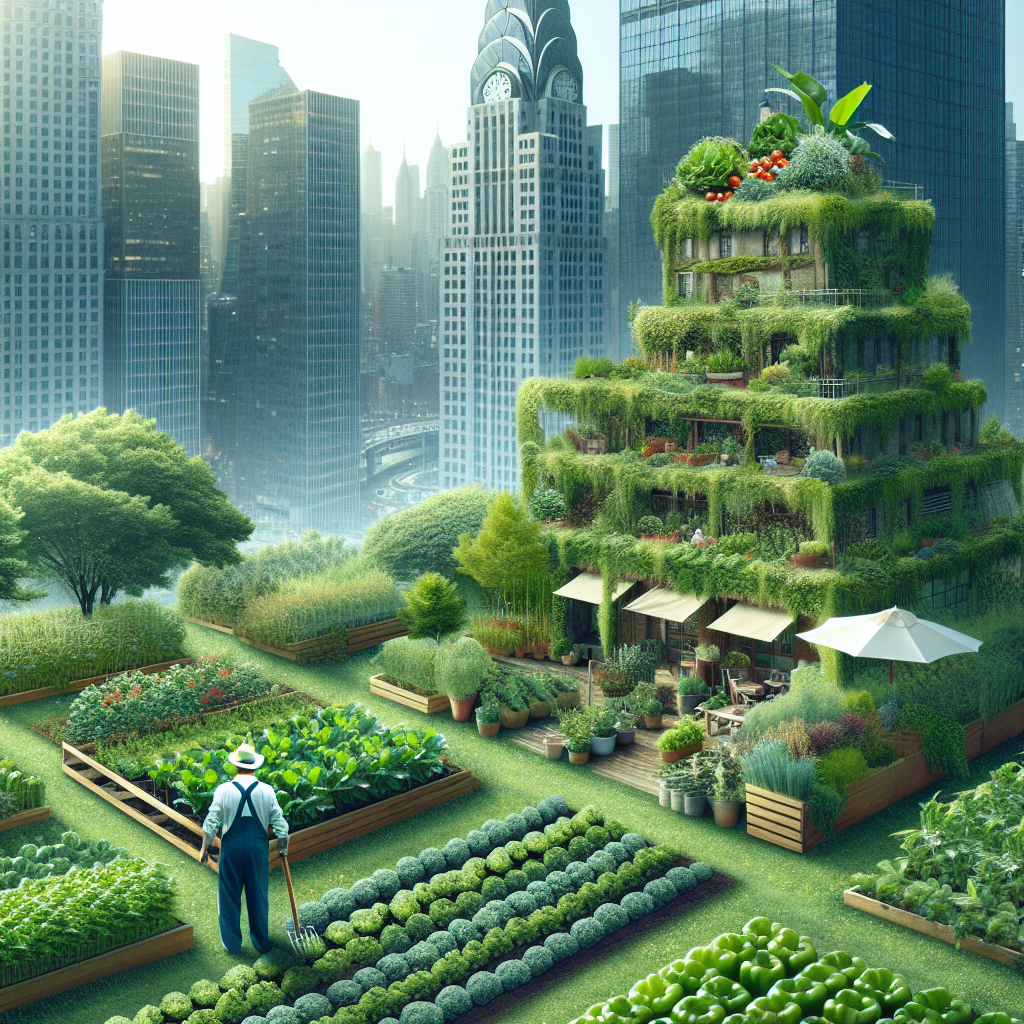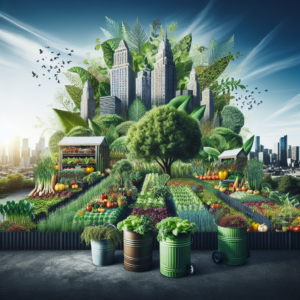
Imagine a bustling city lined with skyscrapers and concrete structures, devoid of any trace of nature. Now, envision the transformation of this concrete jungle into a verdant oasis, where lush greenery and open spaces flourish amidst the bustling urban environment. This remarkable vision is made possible by the practice of urban farming, an innovative and sustainable approach that not only brings agriculture to the heart of the city but also promotes the creation of much-needed green spaces. In this article, we will explore the multitude of benefits that urban farming confers upon our cities, from enhancing air and water quality to fostering a sense of community and well-being. So, get ready to discover how these urban gardens and rooftop farms are not only sowing seeds for a greener future but also cultivating a healthier, happier, and more connected urban landscape.
Benefits of Urban Farming in Promoting Green Spaces
Urban farming is a rapidly growing movement that involves cultivating plants, herbs, fruits, and vegetables in urban environments. It offers numerous benefits for both the environment and the community. By transforming vacant lots, rooftops, and other underutilized spaces into productive farming areas, urban farming promotes the creation of green spaces in cities. These green spaces not only enhance the beauty and aesthetics of urban areas but also provide a range of advantages for the environment and the people who live in those communities.

Improving Air Quality
One significant benefit of urban farming in promoting green spaces is the positive impact it has on air quality. Plants, particularly trees and greenery, play a crucial role in absorbing carbon dioxide and releasing oxygen through photosynthesis. By planting and cultivating a variety of crops and plants, urban farming helps to remove pollutants from the air, thereby improving air quality in urban areas. This is particularly important in densely populated cities, where air pollution can pose serious health risks.
Reducing Urban Heat Island Effect
Another advantage of urban farming in promoting green spaces is its ability to mitigate the urban heat island effect. Urban areas, with their concrete and asphalt surfaces, tend to absorb and retain heat, resulting in higher temperatures compared to nearby rural areas. However, vegetation can help to reduce this effect by providing shade, blocking sunlight, and releasing moisture through transpiration. Urban farming allows green spaces to flourish in the midst of densely developed areas, helping to cool down the surroundings and improve the overall comfort of the urban environment.

Enhancing Biodiversity
Urban farming creates opportunities to enhance biodiversity in cities. By providing habitats for various species, including birds, insects, and small mammals, green spaces formed through urban farming contribute to the preservation of local ecosystems. The presence of diverse plant species and the increased availability of food sources attract a wide range of beneficial organisms, helping to restore and maintain a healthy balance in urban biodiversity. This biodiversity is not only aesthetically pleasing but also essential for the long-term sustainability of urban environments.
Promoting Sustainable Land Use
One notable advantage of urban farming is its ability to promote sustainable land use in urban areas. By repurposing underutilized spaces such as vacant lots, rooftops, and unused buildings, urban farming maximizes the productivity of available land. This reduces the need for urban expansion into surrounding natural areas, preserving valuable ecosystems and reducing the environmental impact of urbanization. Urban farming also encourages the use of organic and sustainable farming practices, minimizing the need for synthetic fertilizers and pesticides, and promoting the production of healthy, locally grown food.

Providing Food Security
Urban farming plays a crucial role in enhancing food security in urban communities. By cultivating crops and producing food locally, urban farmers reduce the dependence on long-distance transportation and large-scale agricultural systems. This means that communities have access to fresh, nutritious produce that is grown right in their neighborhoods. Urban farming also empowers individuals and communities to take control of their own food production and become less reliant on external food sources, ensuring a more sustainable and resilient food system.
Improving Mental Health and Well-being
The presence of green spaces created through urban farming has been shown to have a positive impact on mental health and well-being. Research indicates that exposure to nature and green environments can reduce stress levels, improve mood, and enhance overall psychological well-being. By incorporating green spaces into urban areas, urban farming provides residents with accessible natural environments where they can relax, connect with nature, and engage in physical activity. These spaces serve as a tranquil escape from the hustle and bustle of city life, contributing to enhanced mental health and a better quality of life for urban dwellers.

Creating Community Engagement
Urban farming promotes community engagement and fosters social connections among residents. These green spaces provide opportunities for neighbors to come together, work collaboratively, and build stronger community relationships. Urban farms often organize community events, workshops, and educational programs, encouraging active participation and knowledge sharing among community members. Through these activities, urban farming creates a sense of belonging, pride, and shared ownership among residents, ultimately strengthening social cohesion and building resilient communities.
Supporting Education and Learning
Urban farming offers valuable educational and learning opportunities for individuals of all ages. Schools, colleges, and community organizations can incorporate urban farming into their curricula and programs, providing hands-on learning experiences in various disciplines, from science and biology to nutrition and sustainability. Students can gain a deeper understanding of food systems, environmental stewardship, and the importance of healthy eating through practical engagement with urban farming. Furthermore, urban farms often serve as outdoor classrooms, where people can learn about plant biology, gardening techniques, and sustainable farming practices, fostering a culture of lifelong learning and environmental awareness.

Boosting Local Economy
Urban farming has the potential to boost the local economy by creating job opportunities and supporting small-scale entrepreneurship. As urban farms expand and thrive, they require a diverse range of skills and expertise, including farming, marketing, logistics, and food processing. This leads to the creation of employment opportunities, particularly for local residents. Urban farms can also generate income through the sale of fresh produce, value-added products, and agritourism activities. Additionally, the presence of urban farms can attract visitors and contribute to the revitalization of neighborhoods, boosting local businesses and supporting the overall economic growth of the community.
Addressing Climate Change
Last but not least, urban farming plays a significant role in addressing climate change. By sequestering carbon dioxide, reducing energy consumption through localized production, and promoting sustainable practices, urban farming contributes to the mitigation of greenhouse gas emissions. It also serves as a tangible solution to the increasing demand for food in a growing global population. Through urban farming and the promotion of green spaces, cities can become more resilient to the impacts of climate change, while also actively working towards a more sustainable and greener future.







